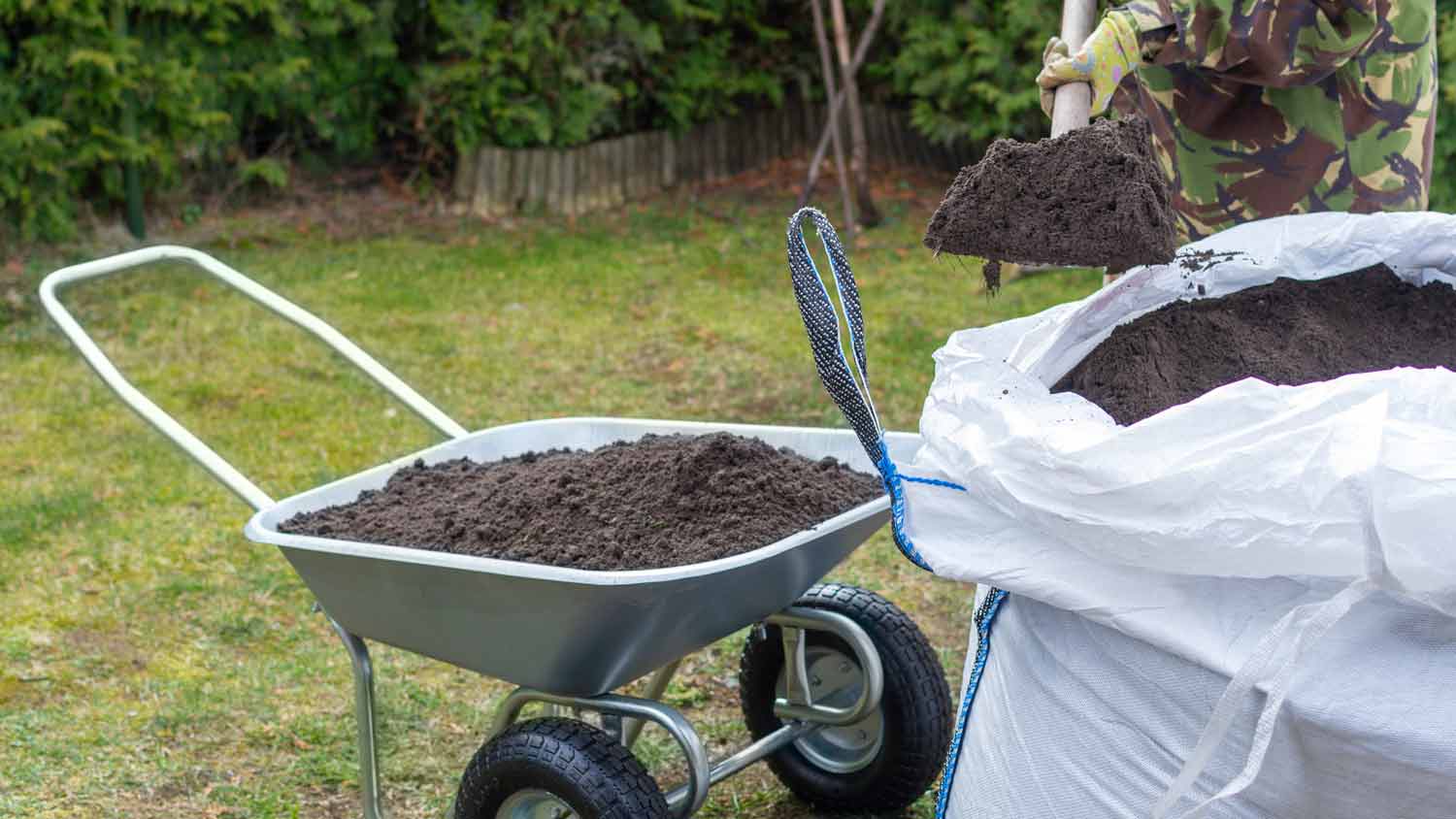
Get clear, up-to-date fill dirt cost info. Learn average prices, cost factors, and tips to save on your next fill dirt project.
Organic mulch works better than inorganic mulch to keep your yard healthy


Mulching helps retain moisture and protect your plants from the sun, wind, rain, and cold.
Unlike inorganic mulch, organic mulch decomposes and nourishes the soil.
Organic mulch costs anywhere from $30 to $150 per cubic yard.
Wood, straw, and pine needles are a few popular types of organic mulch.
It costs between $400 and $500 for the mulch, delivery, and installation for a standard 500-square-foot garden
Before you bag up those grass clippings and leaves, you might want to reconsider and use them to keep your yard looking pristine instead. Organic mulch provides an environmentally friendly alternative to artificial or treated mulches. Here’s how organic mulch works and what types of organic mulches you can use in your landscape.
Organic mulch comes from living or natural materials. It often consists of leaves, grasses, pine needles, compost, or straw. When organic mulch decomposes, it adds nutrients to the soil, such as potassium, phosphorus, and nitrogen. However, since it does decompose, it needs to be replenished every year or two.
Since organic mulch slowly decompresses over time, it provides plants and soil with nutrients. Not only does it help preserve water, shield against weed growth, and prevent soil erosion, it can also do wonders for the aesthetics of your landscape.
While organic mulch may seem like a great option, it’s important to note that you will need to replace it every year or two so it maintains its effectiveness. However, it can attract pests that thrive in decomposing material. It’s also important to consider that organic mulch can be messy since natural materials such as leaves and pine needles tend to blow around on windy days.
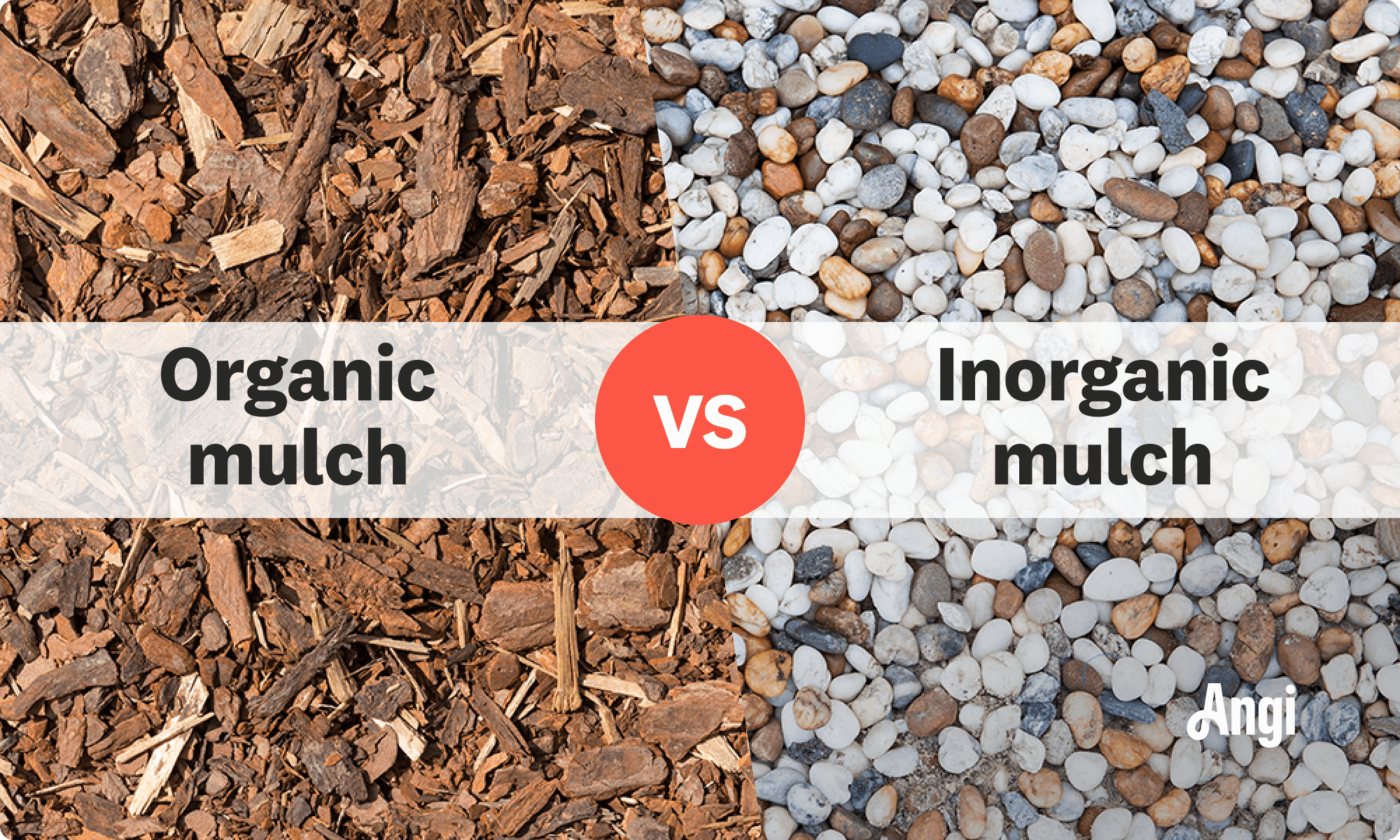
Inorganic mulch can either be artificial or a mined mineral. Examples include stone, gravel, rubber chips, plastic sheeting, landscape fabric, and other materials that don’t break down. Since these materials don’t break down, your landscape won’t need to be replenished much over time. At the same time, inorganic mulch increases the temperatures of the soil and plants and doesn’t boost your soil’s nutrients.
Organic mulch, on the other hand, is different from inorganic mulch made from organic matter that breaks down over time and adds nutrients to the soil that feeds plants and keeps them healthy and vibrant in your yard.
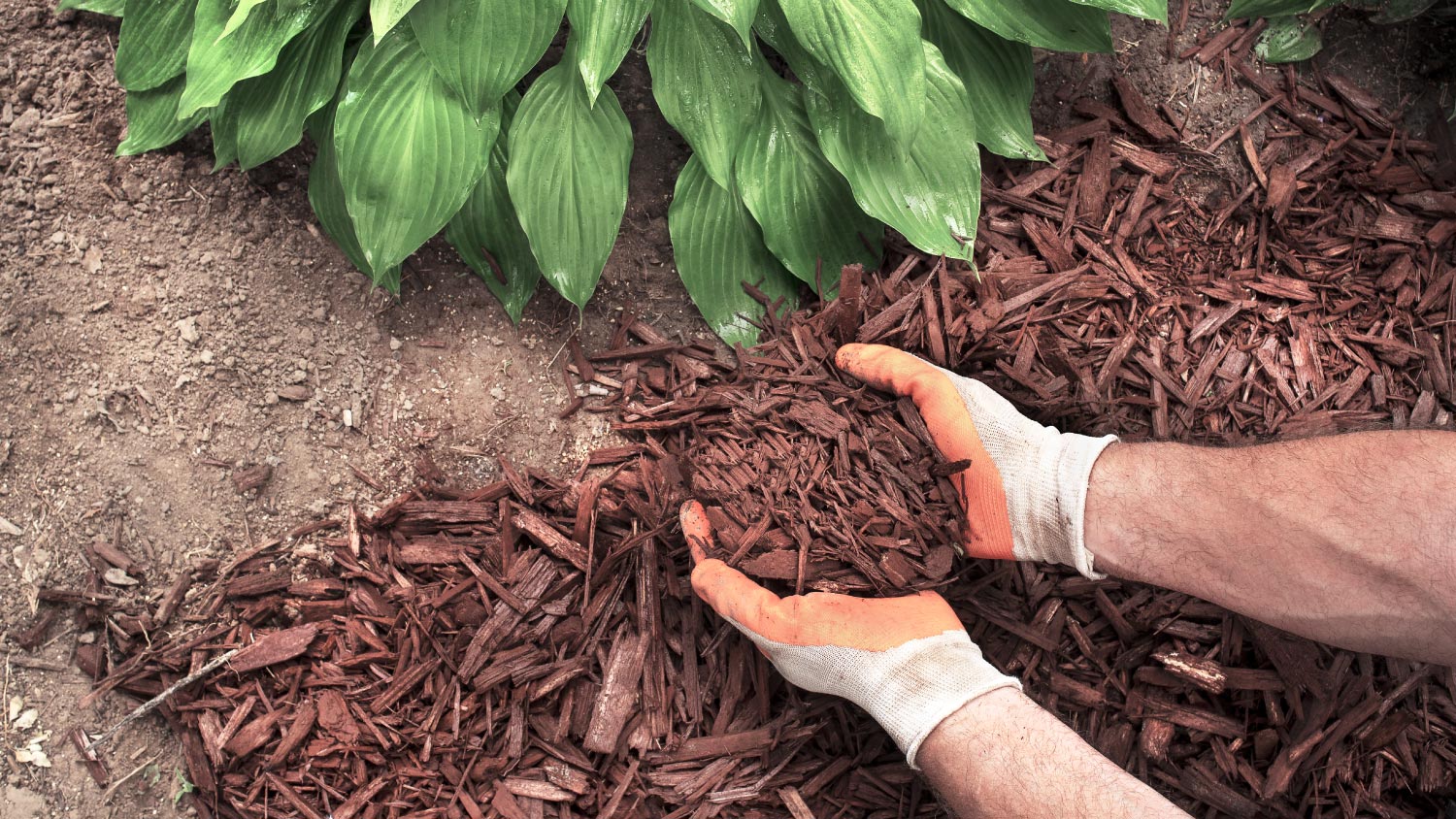
There are numerous benefits to using organic mulch for your yard. A few pros to choosing mulch are as follows:
Mulch is nutritional: Unlike inorganic mulch, which doesn’t break down much over time, organic mulch decomposes quickly and adds nutrients from microorganisms to the soil in the process.
Mulch preserves water: Mulch helps preserve water lost through evaporation by retaining water underneath it.
Mulch is insulating: Mulch can protect plants from freezing temperatures and scorching summer heat.
Mulch prevents weed growth: Mulch keeps seeds from getting to your soil and blocks sunlight, which in turn keeps out unwanted plants.
Mulch protects against soil erosion: For areas that are susceptible to heavy rain, wind, and snow, mulch can prevent soil loss through erosion.
Organic mulch, as with regular mulch, comes with a few disadvantages. These include:
Organic mulch is more costly than inorganic mulch. While inorganic mulch is more expensive upfront, with rubber mulch costing between $80 to $120 per cubic yard, organic mulch, which costs between $30 and $150 per cubic yard on average, needs to be replaced as it decomposes.
Mulch can harbor unwanted critters. Termites, roaches, ants, mice, and snakes are just a few pests you might find in mulch.
You have to add more mulch over time. Though mulch is beneficial in that it breaks down and adds nutrients to the soil, this can be a con for homeowners who don’t want to have to repeat the installation process and spend extra money to add more mulch.
Organic mulch can harm plants if misapplied. You should apply mulch loosely to prevent it from becoming anaerobic as it decomposes, which can make the soil too acidic and actually kill your plants.
A variety of sources can create organic mulch. Wood chips, bark, sawdust, shredded leaves, pine needles, hay, and straw all make effective organic mulches. The one thing they have in common is that they ultimately decay into humus in the soil, which improves the growing environment for plants by adding nutrients to the soil.
Different mulch materials have different properties, so let’s look at how each type of organic mulch works to see which mulch might be right for your home.
Just looking at wood mulch alone gives you a broad selection of organic options for your landscaping needs. Most wood chips and hardwood mulches cost between $30 to $110, depending on which one you choose.
Popular types of wood mulches include:
Natural colored wood-based mulch
Colored mulch, usually dyed red or black
Bark mulch
Cedar mulch
Pine peelings
If you’re in an area prone to termites, cedar mulch is a great option because it contains natural pest-repelling oils. It does fall on the higher end of the price point, at around $100 per cubic yard, but keeping your property free from termite damage will save you more money down the line.
Straw and hay are very inexpensive, easy to place, and effective at adding nutrients to your yard. Straw mulch costs around $40 per cubic yard, whereas hay can be free if you have tall grass on your property.
Keep in mind that these options have a few negatives, as well. They both have a very distinct aesthetic look that might not match what you’re trying to achieve with your yard. Straw is also fluffy and can blow away in the wind, while hay attracts snails and slugs that eat crops.
Even chocolate can help your yard in a way. Cocoa mulch, made from cocoa bean hulls, is an effective mulch for flower beds, adds a pleasant aroma, and costs about $35 per cubic yard. This mulch is also a natural pest repellent. However, cocoa mulch is not safe for dogs, so avoid spreading it if you have a dog in the family.
Pine needles tend to stick together and last a long time, so they’re good for areas where you don’t want to have to replenish more than once a year. Pine needle mulch is warm and attractive in garden beds, but it’s also one of the most expensive, coming in at $150 per cubic yard on average.
On top of that, the needles are acidic and will make the soil too acidic for most plants to grow if your home has plants that aren’t ideal for acidic soil. If you already have pine trees in your yard, however, your soil is likely already more acidic and won’t affect existing plants.
Though technically not mulch, compost works just as effectively as any organic mulch, as it is rich in nutrients. You can buy it by the bag for around $60 per cubic yard or make your own compost pile with yard clippings and food waste.
All organic mulch works to effectively improve your yard’s soil quality while keeping weeds and water evaporation to a minimum. At the same time, not all yards need water retention. In fact, water retention in a climate that is already very humid and moist can increase mold and decay in the garden.
As always, speak with a mulch and topsoil professional near you to determine which type of mulch will work best with your yard to get the most out of your landscape. Mulch costs between $300 and $400 for the installation, delivery, and material for a typical 500-square-foot garden.
From average costs to expert advice, get all the answers you need to get your job done.

Get clear, up-to-date fill dirt cost info. Learn average prices, cost factors, and tips to save on your next fill dirt project.
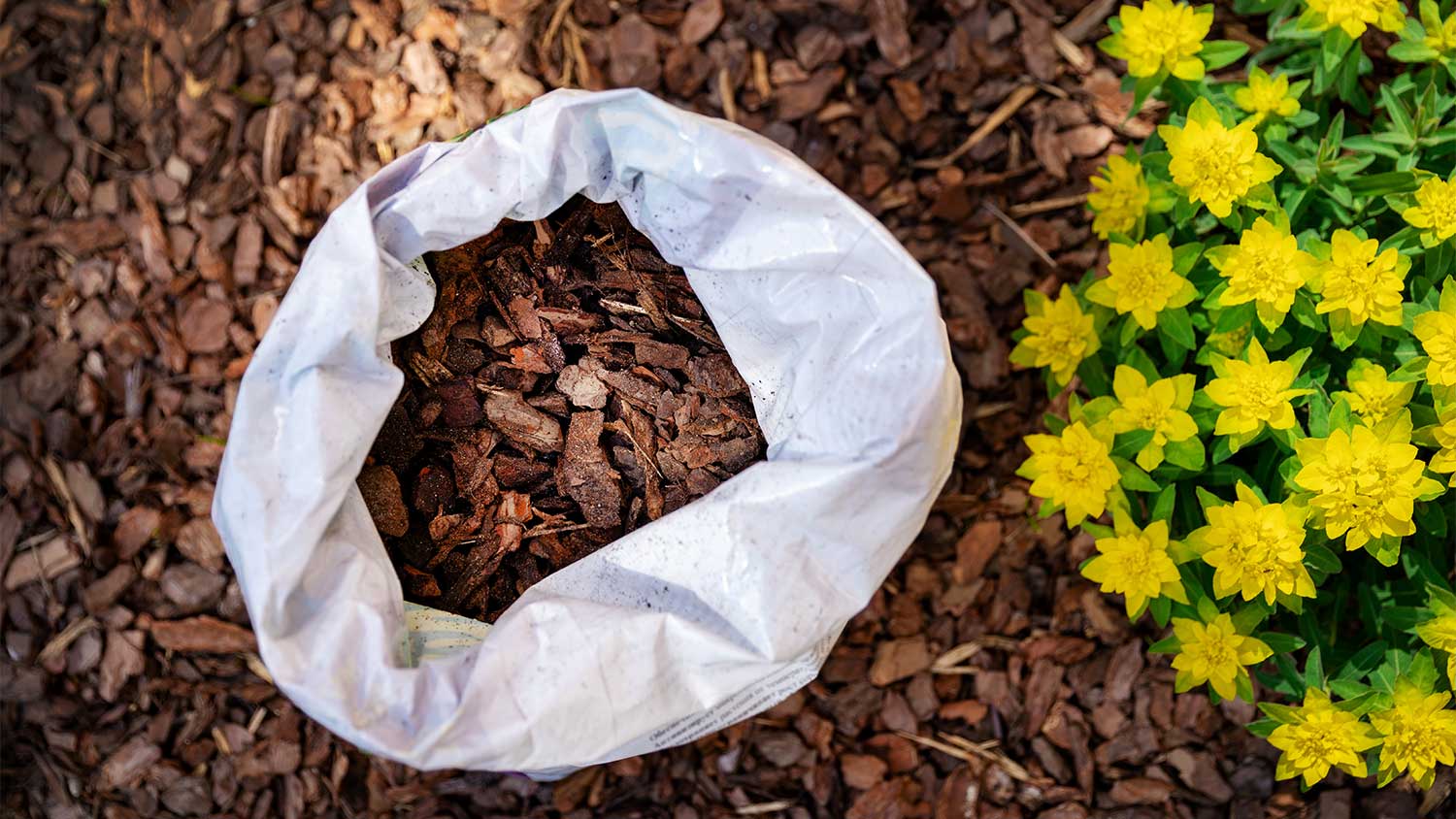
Find out the average mulch delivery and installation cost, plus key factors that impact your price. Learn how to budget, compare options, and save on your landscaping project.
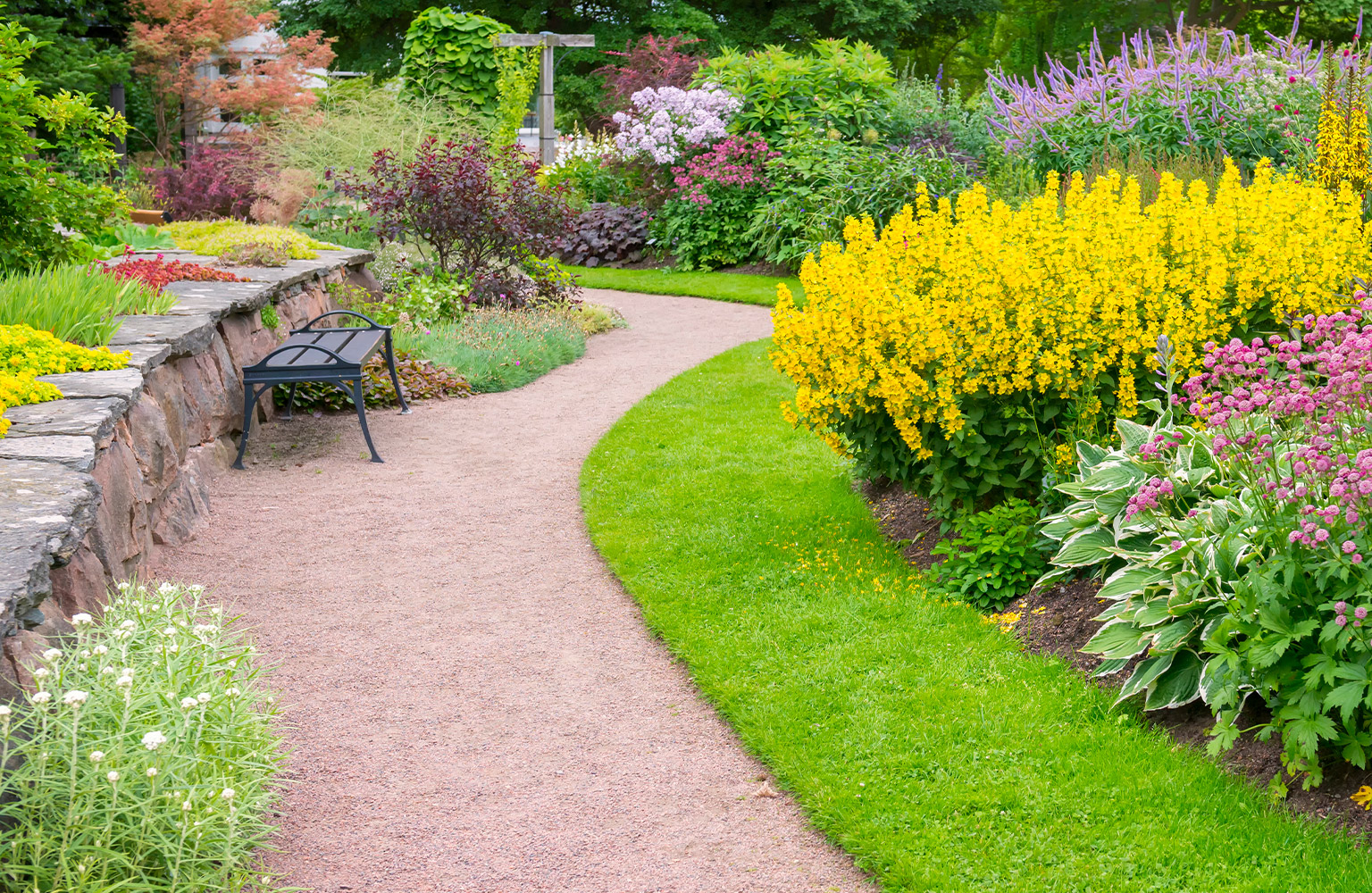
Discover the average sand delivery cost, key price factors, and tips to save on your next project. Get transparent, up-to-date estimates for sand delivery.

What’s the debate between wood chips vs. mulch? Wood chips are pieces or shredded wood from the interior of a tree trunk, while mulch can be made from a variety of materials.

Different types of mulch have different uses in your landscaping. Learn which mulch types are best to use on your property.

If you’re planning a garden and asking yourself, “How many yards of dirt do I need?” this dirt calculator will help you do the math to find the right number.